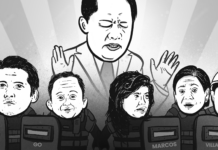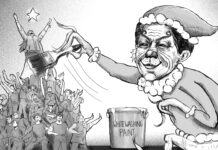POPE FRANCIS’ first encyclical, at first glance, seems a document focused only on environmental issues—the first of its kind, though previous popes have mentioned the significance of care for the environment in their own encyclicals—but it is more than that: it is actually more of a critique of today’s individualism that led to the corruption not just of the natural, but also our social, economic, cultural, and moral ecologies.
His Holiness has taken a sharp turn in social teachings by incorporating environmental issues as an integral part of human and social development. He is not the first to tackle environmental degradation; he in fact quotes his predecessors like Benedict XVI and John Paul II—but his encyclical Laudato Si (Praise be to You) puts the neglect of environment as the primordial effect of the destruction of the other aspects of human life and society.
In the encyclical, the Pontiff reminds people of the fundamental relationship of the person with God, with his or her neighbor, and with creation. This relationship is what makes our responsibility as stewards of God’s creation very important, and all the more supports the fact that problems in natural and social environments are not matters to be dealt with separately, but they should go hand in hand because one affects the other.
“The human environment and the natural environment deteriorate together,” Laudato Si says. “We cannot adequately combat environmental degradation unless we attend to causes related to human and social degradation.”
However, neglect of the environment is not just a cause but also the effect of an even broader epidemic, which is the extreme individualism of our world today, as the Pope asserts that “humans no longer look at themselves as part and parcel of the world, but merely as individuals focused on themselves and on their power.”
In fact, the two problems addressed by the encyclical are the value of labor and the limitations of scientific progress, which respectively undermine workers and give power to only a handful. Because of this, there is little focus on the environment and more on the self. Pope Francis is thus providing a critique of market-driven economics and pits against it an integral ecology as a new paradigm of justice, wherein we human are fully aware of our relationship with our surroundings amd with one another.
“We are not faced with two separate crises, one environmental and the other social, but rather one complex crisis which is both social and environmental,” the Pope says.
For example, Francis, despite acknowledging the contribution of technology to the improvement of the quality of human life, criticizes technology and those with the power to use it to wield dominance over the larger, poorer parts of the global community.
The Pope, in turn, calls for dialogue in addressing the issues. Those in office and in positions of power are the ones faced with the challenge, since they have the means and the power to instigate radical changes in society.
“Here, continuity is essential, because policies related to climate change and environmental protection cannot be altered with every change of government… That is why, in the absence of pressure from the public and from civic institutions, political authorities will always be reluctant to intervene, all the more when urgent needs must be met.”
That is the challenge for the largest Catholic country in Asia, where apathy is rampant and political will is weak, if not nonexistent.
The country, rich in natural resources, is not only plagued with environmental disasters and abuses, but also political and social conflicts, because of the widening gap between the rich and the poor, as well as graft and corruption despite the political leadership’s claims of sterling economic performance and good government.
To say that Laudato Si is an encyclical preaching pedantically about the state of the global ecology that scientists already know about and have obviously more expertise in, is a misreading of what Pope Francis is saying. Corruption of the environment is a corruption of the other aspects of human life,he’s saying. Those in power—those who control technology, government, and the economy—exploit both natrural and social environments.
Summoning the Church’s gift of prophecy, His Holiness applies eschatology to ecology: “What kind of world do we want to leave to those who come after us, to children who are now growing up? This question not only concerns the environment in isolation; the issue cannot be approached piecemeal. When we ask ourselves what kind of world we want to leave behind, we think in the first place of its general direction, its meaning and its values. Unless we struggle with these deeper issues, I do not believe that our concern for ecology will produce significant results.”














